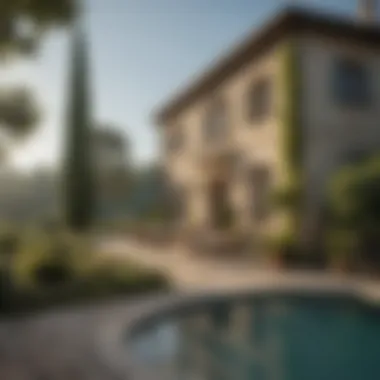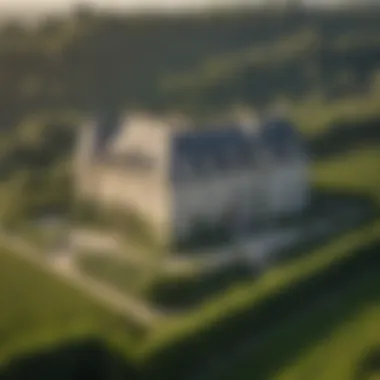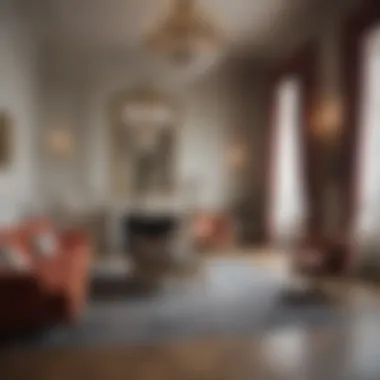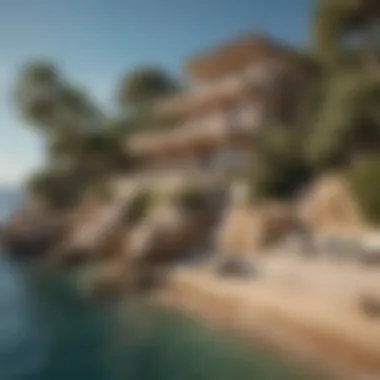Exploring Luxury Homes for Sale in France: A Guide


Intro
Exploring the landscape of luxurious properties in France offers a unique blend of culture and elegance. For discerning buyers, the journey involves not only finding the ideal home but also understanding the nuances of each region. From the enchanting Côte d'Azur to the serene countryside of Provence, each locale provides distinct offerings that appeal to varied tastes. This guide serves to illuminate the intricacies of the French real estate market and equip readers with the knowledge necessary to navigate their purchasing decisions effectively.
Outdoor Decor Ideas
When it comes to enhancing the charm of French homes, outdoor decor is pivotal. Homeowners in France often prioritize creating inviting spaces that reflect both style and functionality.
Seasonal Inspirations
With four distinct seasons, outdoor decor can vary significantly throughout the year. Spring welcomes vibrant blooms, while summer calls for elegant outdoor seating. Autumn brings rich, earthy tones, and winter offers a chance for warm, cozy decorations.
Furniture Selection
Choosing the right furniture is essential for outdoor spaces. Wrought iron and wicker are popular for their durability and aesthetic appeal. Key pieces like comfortable lounges or intricate dining sets can transform a garden into an oasis.
Decorative Lighting
The ambiance of outdoor areas can be elevated through decorative lighting. String lights, lanterns, and sconces not only provide illumination but also add character during evenings. Soft lighting creates an inviting atmosphere that aligns with the French art de vivre.
Plant Arrangements
In the French garden, choosing the right plants is both an art and a science. Lavender, rosemary, and olive trees are not just visually appealing but also resonate with the local climate. Arranging these plants thoughtfully can enhance your outdoor space significantly.
Hardscaping Solutions
Incorporating hardscaping elements such as stone pathways, patios, or even water features can add structure to a landscape. Natural stone options often resonate with the rustic charm typical of traditional French homes.
Sustainable Practices
Sustainability is becoming increasingly important in outdoor design. Homeowners can opt for native plants that require less water and maintenance. Using recycled materials for decor and furniture also reflects a commitment to sustainable practices while enhancing aesthetic appeal.
“In the realm of luxury living, the harmony of outdoor spaces plays a crucial role in overall home enjoyment.”
Outdoor Entertaining
France's temperate climate lends itself well to outdoor entertaining. Opulent alfresco dining settings create an atmosphere for memorable gatherings.
Hosting Luxurious Gatherings
An elegant setting is key to memorable events. Fine tableware, exquisite linens, and gourmet cuisine set the stage for luxury gatherings. Custom floral arrangements can further personalize the experience, adding a touch of sophistication.
Party Planning Tips
When planning an outdoor event, consider the overall theme. Seasonal motifs, color coordination, and appropriate music can elevate the experience. Ensure adequate seating and comfort for guests, making thoughtful arrangements for various weather scenarios.
Al Fresco Dining Trends
There has been a notable rise in the trend of al fresco dining. Open-air kitchens and dining areas allow for seamless entertaining. The use of outdoor heaters and fire pits ensures that gatherings can extend well into the evening.
Exclusive Destinations
As you explore the luxury real estate market in France, consider the prominence of exclusive destinations.
Hidden Gems
While popular areas like Paris and Nice often steal the spotlight, hidden gems exist throughout France. Markets in small towns offer a blend of community charm and investment potential. Locations in Dordogne or Languedoc-Roussillon are often less known but boast beauty and tranquility.
Luxury Resorts
Famed resorts like Château de Bagnols or Les Airelles in Courchevel redefine luxury in real estate. They provide a unique investment opportunity while offering personal enjoyment and access to high-end amenities.
Private Villas
The allure of private villas is undeniable. Coastal properties along the French Riviera or secluded estates in the French countryside offer both elegance and privacy.
Travel Guides
To navigate the real estate market effectively, being well-versed in regional culture is advantageous.
Cultural Experiences


Engaging with local culture enhances the experience. Attending festivals, touring local markets, and understanding regional customs are pivotal in appreciating potential investment areas.
Culinary Adventures
France is renowned for its culinary offerings. Whether savoring Michelin-starred dining or exploring local bistros, a connection with France’s cuisine enriches the living experience. This knowledge adds substantial depth to lifestyle choices in real estate.
Shopping Escapades
Understanding local shopping experiences adds another layer to living in France. From artisanal markets to high-end boutiques, knowing where to shop enhances quality of life. Incorporating this knowledge aids in making informed decisions about property location.
Home and Interiors
Lastly, modern trends in home interiors are crucial for prospective buyers.
Interior Design Trends
Trends vary based on regions. While Parisian homes may embrace minimalism, properties in Provence could showcase rustic charm. The key is aligning interior design with personal taste and regional style.
Home Organization
Creating a harmonious home environment necessitates effective organization. Emphasizing storage solutions that marry style and function helps to maintain an elegant atmosphere.
Smart Home Innovations
Incorporating technology significantly impacts property value. Smart home innovations such as climate control, security systems, and automated lighting can enhance both convenience and luxury, making homes more attractive to potential buyers.
This comprehensive guide aims to navigate the multifaceted landscape of real estate in France, providing insights into home buying, decor, and lifestyle choices that elevate the experience of living in this exquisite country.
Understanding the Appeal of French Properties
The allure of French properties extends beyond mere aesthetics. Understanding the appeal of these homes is crucial for anyone considering an investment in this market. Buyers often seek not only a place to live but also a connection to the rich tapestry of French culture and history.
Historical Significance
French properties carry a weight of history, telling stories of ages past. Homes like châteaux evoke dreams of nobility and grandeur. Each stone may hold centuries of art and architecture. Owning such a property allows one to partake in this legacy. Furthermore, historic homes often come with preservation requirements. Buyers should be aware of these to maintain the integrity of their investment. Delving into the past can deepen one’s appreciation and connection to the property.
Architectural Variety
The architectural styles across France are as diverse as its culture. From the grand designs of the French Renaissance to the minimalist lines of modern villas, the variety is striking. This diversity ensures there is something for every taste. Some might prefer the rustic charm of a countryside farmhouse, while others seek the elegance of an urban apartment with classic Parisian flair. It’s essential for buyers to explore these various styles to find what resonates with their personal aesthetic.
Cultural Integration
When one buys a home in France, it is not merely about the physical structure. It is also about integrating into a vibrant culture. French properties often reflect local traditions and customs, providing an opportunity to engage with the community. This creates a richer living experience. Those moving to France can expect to engage with local markets, festivals, and culinary delights. Living in such a setting encourages one to embrace the local lifestyle fully.
Understanding the appeal of French properties is not just about the buildings themselves, but about the experiences and history they offer.
Investing in French real estate is thus a multifaceted decision. Buyers must consider historical significance, architectural variety, and the chance for genuine cultural integration. Each factor plays a pivotal role in the decision-making process when exploring homes for sale in France.
Regions to Explore for Homes for Sale
Exploring the regions of France helps potential buyers understand what makes each area unique. Each region comes with its own character, which influences the properties for sale. Knowing about these regions allows discerning individuals to find a home that resonates with their lifestyle and preferences. In addition, local economies, cultural amenities, and climate all play a role in property value and desirability. Being informed can lead to successful investments.
Provence: A Blend of Tradition and Modernity
Provence stands out for its captivating landscapes, combining fields of lavender with historical towns. The blend of ancient traditions with modern living is appealing to many. Buyers can find traditional stone houses as well as contemporary villas, allowing for both lifestyle choices. Key cities like Avignon offer rich culture while enjoying the Mediterranean climate.
Factors to consider:
- Proximity to essential services
- Local farmers' markets
- Wine production and culinary experiences
French Riviera: Luxury and Glamour
The French Riviera represents the pinnacle of luxury living. Cities like Nice and Cannes attract affluent residents and tourists alike. Properties here often come with stunning seafront views or rich historical backgrounds. This region offers exclusive villas and apartments, suited for high-end buyers.
Understanding the market is crucial. Prices can vary significantly and often reflect both location and property features. This is a prime location for networking and socializing.
Normandy: Rustic Charm
Normandy is known for its picturesque countryside and fascinating history. The region boasts a variety of homes, from charming cottages to grand manors. The appeal of visiting historic sites such as the landing beaches adds to the charm of living here.
Consider the importance of:


- Access to outdoor activities
- Proximity to Paris via train
- Art and culinary heritage
Brittany: Coastal Beauty
Brittany captivates with its dramatic coastlines and vibrant culture. Properties near the ocean often feature stunning views. This region is characterized by its distinct regional identity, seen in its architecture and traditions. Buyers can enjoy coastal life, offering both peace and recreation.
Important aspects:
- Maritime culture
- Local seafood and cuisine
- Historic and contemporary homes
Ile-de-France: Urban Sophistication
Ile-de-France, encompassing Paris, offers a unique urban experience. This region is the hub of French culture and business. Potential buyers seeking luxury apartments or historic buildings will find many options. The appeal of city life comes with access to world-class dining, art, and fashion.
Points to ponder:
- Diverse neighborhoods with distinct feels
- Public transportation availability
- Investment potential in a global city
Understanding the distinct regions in France is essential for making informed real estate choices. Every area offers something unique, aligning with various buyer preferences.
Types of Homes Available:
Understanding the types of homes available in France is crucial for anyone considering a property investment in the country. Each type of home offers distinctive characteristics and appeals to different lifestyles and preferences. Knowledge of these options can guide potential buyers in making informed decisions and identifying properties that align with their unique visions.
Châteaux: Grandeur and History
Châteaux offer a glimpse into France's regal past. These spacious estates often feature elaborate architecture and vast grounds, attracting those looking for a sense of grandeur. Owning a château means diving deeply into history, as many of these properties date back several centuries. Living in a château allows for a lifestyle steeped in tradition while benefiting from modern amenities.
Investing in a château often requires substantial maintenance. Potential buyers should consider this, as renovation costs can be high. Nonetheless, for enthusiasts of significant historical architecture, the allure of a château is hard to resist.
Villas: Modern Living in Scenic Locations
French villas are among the most sought-after homes, known for their modern designs and stunning locations. Often found in picturesque areas like Provence and the French Riviera, these properties offer outdoor living spaces that integrate with the landscape. Villa living promotes a balance of luxury and comfort.
Buyers appreciate the emphasis on natural light and open layouts in modern villas. It is essential to evaluate location and amenities, such as proximity to schools, shopping, and cultural attractions. Villas can provide a serene retreat while remaining connected to vibrant communities.
Historic Homes: Preserving Heritage
Historic homes in France reflect the country’s rich architectural diversity. These properties, whether charming cottages or stately mansions, captivate with their unique stories and distinctive designs. Buying a historic home means preserving a piece of cultural lineage, often accompanied by unique architectural features and intriguing local histories.
Consideration for modern living needs is vital. Some historic homes may need updates for comfort and efficiency. Buyers should assess potential renovations alongside the home’s character. This balance of preservation and modernization plays a significant role in choosing a historic property.
Apartments: City Life and Convenience
For those seeking an urban lifestyle, apartments in cities like Paris offer convenience and access to culture. French apartments vary in size, from cozy studios to spacious layouts, catering to diverse needs. Residents can enjoy the vibrancy of city life, with cafes, art galleries, and shops just steps away.
When considering an apartment, factors like building age, neighborhood atmosphere, and available amenities are crucial. The maintenance and homeowner regulations may differ from other property types. Buyers must evaluate whether an apartment fits their lifestyle and investment goals.
A Dive into the Buying Process
Purchasing a property in France is an intricate affair that requires careful consideration and thorough understanding. The buying process is a crucial element for potential buyers, especially for high-end real estate. This section aims to outline and simplify the steps involved, ensuring that buyers are well-informed and poised to make sound decisions.
Researching the Market
Understanding the French real estate market is vital before committing to a property. The market can vary significantly by region, influenced by local demand, economic conditions, and cultural factors. Begin by gathering information on recent sales, pricing trends, and property types that appeal to your preferences. Various tools and platforms, such as SeLoger and Le Bon Coin, offer valuable insights.
Additionally, networking with locals or expats can provide real-time information on the area's atmosphere and potential future developments. Networking can help uncover hidden gems not listed publicly. This initial research will give a comprehensive overview and set realistic expectations, therefore aiding in successful negotiations later.
Engaging with Real Estate Agents
Choosing the right real estate agent is another important step in the buying process. An experienced agent who specializes in luxury properties can offer in-depth local knowledge and valuable negotiation skills. When selecting an agent, consider their track record, client reviews, and understanding of your desired location. In France, agents often charge commissions that range between 3% to 10%, depending on the property's price.
A good agent will help navigate any obstacles, articulate your needs clearly, and ultimately represent your best interests throughout the transaction. Building a strong rapport with your agent can lead to more favorable outcomes, as they can advocate for you effectively in dealings with sellers.
Understanding Legal Considerations
Real estate transactions in France involve several legal regulations that borrowers must comprehend fully. Engaging a notary is essential, as they handle the legal aspects of buying property. Their role includes drafting contracts, verifying legal titles, and ensuring all parties comply with the law. Note that the notary’s fees typically vary between 2% to 8% of the property's price, depending on various factors, such as the property's purchase price.
Buyers should also be aware of the diagnostic reports necessary for property transactions. These include checks for lead, asbestos, termites, and energy efficiency. Familiarizing oneself with these requirements can eliminate potential stalls in the buying process and reinforce ownership security.
Financing Your Purchase


Financing options in France can differ from those in other countries. Buyers should evaluate their financing needs and explore various options. Options may include traditional bank loans, mortgages, or private funds. French banks often expect borrowers to provide proof of income and a substantial deposit, typically around 20% of the property value.
Additionally, individuals planning to buy a second home may face higher interest rates. Therefore, securing pre-approval for a mortgage before starting your search will streamline the purchasing process. Understanding the nuances of financing your purchase can alleviate stress and allow for smooth transactions, ultimately supporting your long-term investment goals.
Touring Homes: What to Expect
Touring homes for sale in France is a critical step for anyone considering an investment in real estate. It is more than just viewing properties; it is about experiencing the essence of each location and understanding the lifestyle it offers. For high-end buyers, the ability to visualize the home in context can influence their decision-making significantly.
When you view a home, you get a tactile sense of the space. This includes its layout, ambience, and the quality of materials used. Observing the details helps you assess if the property aligns with your needs and aesthetic preferences. Plus, it allows you to experience the neighborhood dynamics, which can greatly impact your living experience.
Virtual Tours: Technology in Perspective
Virtual tours have transformed how buyers can explore potential homes from afar. Significantly, they provide a comprehensive view of a property without the necessity of immediate travel. This convenience can save time and help you short-list your options effectively.
Many high-end listings in France offer virtual reality experiences that allow users to navigate through spaces as if they were physically present. These tours present key features such as:
- Spatial layout
- High-quality finishes
- Outdoor spaces
In essence, virtual tours serve as an initial filter for serious buyers, enabling them to make informed decisions about which homes to prioritize for in-person visits. They harness advanced technology to deliver detailed perspectives of the property. This option is especially beneficial for international buyers who may not be able to visit regularly.
"A virtual tour can provide insights that photos alone may not convey, allowing buyers to assess properties with greater clarity."
In-Person Visits: Key Considerations
Once a short list has been made through virtual tours, in-person visits are essential. They carry unique benefits that virtual platforms cannot replicate. Experiencing the property in real life allows potential buyers to gauge various aspects effectively. Considerations during these visits should include:
- Natural Light and Atmosphere: Assess how light enters different rooms at various times of day.
- Sound Levels: Notice sounds from outside, which can affect your enjoyment of the home.
- Craftsmanship Quality: Examine the physical aspects, such as finishes and attention to detail.
Moreover, inspecting common areas is crucial in multi-unit buildings. Understanding the management and policies can influence your experience.
In-person visits facilitate critical discussions with real estate agents about specific features and potential renovations. This interaction can provide insights into hidden costs that may arise after purchase, making your decision process more nuanced. Ultimately, the combination of virtual and in-person tours enhances the buying experience. It provides a robust framework for evaluating properties with confidence and clarity.
The Future of French Real Estate
The landscape of French real estate is evolving. This evolution carries significant implications for potential buyers and investors. Understanding these changes becomes paramount, especially for those looking to invest in luxury properties. Not only does it provide insights into market viability, but it also encompasses cultural and economic factors shaping the future of homes for sale in France.
The future will likely be influenced by various market trends and the growing importance of sustainability in housing. Buyers today seek not just a luxurious space but one that aligns with their values. Thus, recognizing shifts in preferences and developments within the market helps navigate the real estate territory more effectively.
Market Trends and Predictions
A keen analysis of current market trends indicates a rise in demand for French homes among international buyers. This uptick stems from a variety of factors, including a stable political environment and a recovering economy, which provides a favorable investment climate. The historical allure of France also plays a critical role, drawing individuals seeking a lifestyle change or a second home in a picturesque setting.
Some specific trends to note are:
- Urban to Rural Shift: More buyers are considering properties outside major cities. The pandemic prompted a desire for space and tranquility, leading to increased interest in rural and semi-rural regions like Normandy and Provence.
- Smart Technology Integration: Homes equipped with advanced technology are gaining popularity. This includes smart home features that enhance efficiency and security, making properties more attractive to tech-savvy buyers.
- Diverse Investment Sources: Investors are exploring various property types, from historic homes to modern villas. This diversification reflects a broader understanding of real estate as an asset class with potential for appreciation.
Sustainability in Housing
The emphasis on sustainability is becoming increasingly significant in the French housing market. Homebuyers are now more concerned about the environmental impact of their purchases. This trend includes a preference for properties that meet energy efficiency standards or are built using sustainable materials.
Noteworthy considerations include:
- Energy Efficiency Ratings: Properties boasting favorable energy ratings are often valued higher. Buyers recognize that efficient homes can lead to lower utility costs and a reduced carbon footprint.
- Eco-Friendly Features: Many new developments incorporate green spaces, solar panels, and eco-friendly construction methods. Such features attract discerning buyers who value sustainability.
- Regulatory Changes: Recent regulations around energy efficiency in homes further shape market expectations. Properties that do not meet these standards may see a decline in interest, shaping buyer preferences toward more compliant options.
The evolving landscape of French real estate invites opportunities and challenges that require informed decision-making.
In summary, understanding the future of French real estate fills potential investors with valuable insights. By focusing on market trends and sustainability, buyers can make informed choices that will resonate within their personal and investment strategies.
The End: Making Informed Decisions in the French Market
Making informed decisions when exploring the French real estate market is crucial. The French property landscape is diverse, embodying different architectural styles and cultural nuances across various regions. Understanding these elements helps buyers find homes that resonate with their personal tastes and investment goals. Notably, each purchase should align not only with aesthetic preferences but also with practical considerations like location, budget, and long-term value prospects.
Evaluating Your Preferences
Before diving into the market, evaluating personal preferences is essential. This encompasses identifying what matters most in a home. Consideration should include factors such as proximity to amenities, rural versus urban living, and desired property size. Each of these aspects significantly influences both the enjoyment of the property and its resale value.
- Lifestyle Needs: Reflect on whether you prefer vibrant urban life or serene countryside. This choice can greatly narrow down potential regions.
- Property Type: Be clear about what type of property resonates with you. Do you lean towards a modern villa or a historic château? Understanding your preferences here will streamline your search.
- Investment Goals: Determine if you're buying as a primary residence, a vacation home, or an investment property. Each intention will shape your selection process.
Tip: Create a list of must-haves versus nice-to-haves. This clarity can direct your search more effectively.
Seeking Professional Guidance
Navigating the French real estate market can be complex, making professional guidance invaluable. Experts such as real estate agents, legal advisors, and financial consultants can help you avoid pitfalls and streamline the purchasing process. They understand the intricacies of local regulations, pricing trends, and market forecasts, providing insights that are not readily available to the average buyer.
- Real Estate Agents: Look for agents who specialize in the specific regions and property types of interest. They can offer tailored advice and access to listings that may not be publicly advertised.
- Legal Advisors: Engaging a lawyer familiar with French property laws is critical. They will review contracts, clarify legal obligations, and ensure that you comply with local laws.
- Financial Consultants: A financial expert can assist in evaluating financing options and analyzing potential return on investment.
Remember: Professional help can sometimes save money in the long term by helping avoid costly mistakes.
In summary, making informed decisions in the French market requires careful evaluation of personal preferences and seeking the right professional guidance. With the right approach, buyers can successfully navigate the complexities of the French real estate landscape and find a property that meets their needs.







